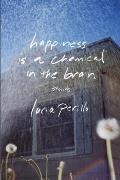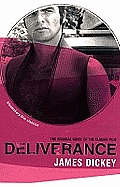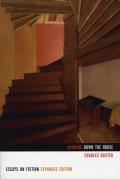
It should not be so hard to write both poetry and fiction. Both arts, after all, make use of the same materials, words and punctuation. Poems frequently utilize the strategies of fiction, which in turn, in the hands of the best writers, listens carefully to the sounds that it is making. Even poems which do not tell a story contain descriptions of people or settings, and all poems have to figure out how to handle time, which is usually the tallest obstacle that stories also have to hurdle.
And yet few writers have been officially crowned in both genres — just Thomas Hardy and D. H. Lawrence come unequivocally to mind. In my high school in the 1970s, we read Sylvia Plath's Bell Jar, but the critical consensus has come to be that Plath's novel lacks the maturity of her poems — even Plath dismissed the novel as a potboiler — and it is not now given equal footing in the canon. Prolific novelists, such as John Updike and Margaret Atwood, who write poetry as an ancillary art, are usually suspected of devoting little time to working and re-working their poems, for how could there possibly be enough time when the Collected Poems of someone like T. S. Eliot occupy just one relatively slender book? Poetry is not supposed to be so easy.
The negative critical reception that poems by novelists endure may also have to do with their practical modes of operation, the prosaic way that their syntax marches straightforwardly toward their targets. Bringing too much of fiction into poems can make it seem that poetry is just prose broken into lines. Lately we have the example of the poet and novelist Laura Kasischke, who has published many books of both poetry and fiction. Perhaps it is because Kasischke's poems steer a zigzag path through elusive subject matter, toward ambiguous conclusions, that she has avoided the criticism often aimed at poets who also write mainstream prose; her new book of poems, Space, in Chains, recently won the National Book Critics Circle Award.
 In their more cynical moods, readers might suspect that poets are lured to fiction by the greater readership that fiction enjoys and the slightly improved possibility for making money from a work of fiction. As far as I know, the only poem that's been offered a movie deal is Elizabeth Bishop's "The Man-Moth" (at least I read that factoid years ago, though no movie has forthcome, and a quick check on the computer didn't corroborate it, so perhaps it's just an urban legend). To have one's work made into a movie is to score a touchdown on the cultural playing field, and poets generally stand on the sidelines of these games, although the poet James Dickey made a swaggering appearance in the film of his great swaggering novel Deliverance.
In their more cynical moods, readers might suspect that poets are lured to fiction by the greater readership that fiction enjoys and the slightly improved possibility for making money from a work of fiction. As far as I know, the only poem that's been offered a movie deal is Elizabeth Bishop's "The Man-Moth" (at least I read that factoid years ago, though no movie has forthcome, and a quick check on the computer didn't corroborate it, so perhaps it's just an urban legend). To have one's work made into a movie is to score a touchdown on the cultural playing field, and poets generally stand on the sidelines of these games, although the poet James Dickey made a swaggering appearance in the film of his great swaggering novel Deliverance.
Even great poets, poets lauded with every honor that poetry's short receiving line can give, have felt lacking, never having received the small consolations of fiction. John Berryman, having won the Pulitzer Prize for 77 Dream Songs, spent the last months of his life drafting an autobiographical novel about a man undergoing withdrawal from alcohol addiction. His journal entries reveal that one of the things that drove him in this endeavor was his envy of the popular success of the novels of his friend Saul Bellow, and I've wondered if the stalled progress on his own novel isn't what drove him to climb over the railing of the Washington Avenue Bridge.
There is a temptation to say that poets and fiction writers are separate animals, like aardvarks and zebras, and that it's pointless for an aardvark to try to gallop on the plains or a zebra to crawl down a hole, but I find myself growing hot under the collar when people lay down absolutes about the difference between the poetic and the storytelling soul. Charles Baxter, a fiction writer who also has published several books of poetry, but who describes himself as an ex-poet in his essay collection Burning Down the House, writes:
The poets start the party and dance the longest, but they don't know how to plug in the audio system, and they have to wait for the prose writers to show them where the on/off switch is. In general, poets do not know where the on/off switch is, anywhere in life. They are usually off unless they are forcibly turned on, and they stay on until they are taken to the emergency room, where they are medicated and turned off again.
 These sorts of theories have it that poets and fiction writers are mutually exclusive sub-sets of writers due to fundamental differences in temperament. But of course we know — from not only Dickey and Plath but also Bishop and Jarrell — that there is some narrow lemon-shaped area of overlap. And as it is a truth of human nature that one finds fault with those habits of mind that one's self indulges in, I will say that I too have my pet theory about the difference between poets and fiction writers, or at least poems and stories. Which is that poems are grounded in a humanity that is assumed to be shared, whereas stories are interested in the sharp edges of character and are less liable to have faith in an elemental human nature, though my theory can doubtlessly be shot down with the evidence of many a story. In fact, a common blueprint for the moral scaffold in the human brain may be what allows us to make sense of works of fiction in the first place, so that one person does not say that King Lear is a tragedy and the next person says that it's a coconut cream pie.
These sorts of theories have it that poets and fiction writers are mutually exclusive sub-sets of writers due to fundamental differences in temperament. But of course we know — from not only Dickey and Plath but also Bishop and Jarrell — that there is some narrow lemon-shaped area of overlap. And as it is a truth of human nature that one finds fault with those habits of mind that one's self indulges in, I will say that I too have my pet theory about the difference between poets and fiction writers, or at least poems and stories. Which is that poems are grounded in a humanity that is assumed to be shared, whereas stories are interested in the sharp edges of character and are less liable to have faith in an elemental human nature, though my theory can doubtlessly be shot down with the evidence of many a story. In fact, a common blueprint for the moral scaffold in the human brain may be what allows us to make sense of works of fiction in the first place, so that one person does not say that King Lear is a tragedy and the next person says that it's a coconut cream pie.
I once took a course with the poet Hayden Carruth in which, on the first day of the semester, he had us listen to Billie Holiday singing "Billie's Blues." At the end of the song came a groan from one of her horn players, and we had to say what we thought it meant. Of course we had sexual theories that most of us were too timid to offer. To me the groan seemed to be generated by internal pressure that hadn't been released, that had to be released, before the recoding ended, and I think of the stories that I've written over the years of my poetry-writing life in that same way, as emanations of residual energy.
Late in his long life, the novelist Thomas Hardy turned away from fiction and devoted himself exclusively to poetry, and I've read that this turn was given momentum by the arrival of motion pictures, by his thinking that the readership for novels was bound to shrink because of this new technology. Nowadays it's funny to think that modern media would drive anyone toward poetry, and I've always wanted to write a poem about Hardy watching the film version of Tess of the D'Urbervilles or The Mayor of Casterbridge or Far from the Madding Crowd, how the flickering light fell on his face in the darkened room.
Or maybe it will be a researched work of fiction verité, in the manner of Raymond Carver's great short story about the death of Anton Chekhov.